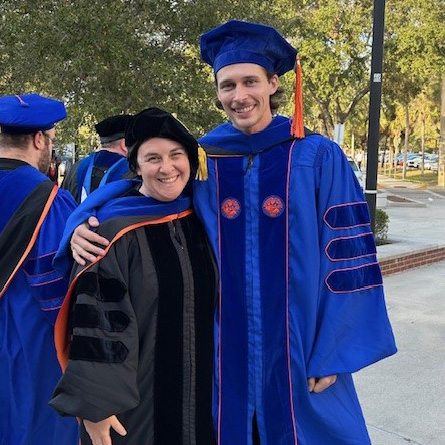
Dr. Justin Waletich, a Ph.D. student from the Schnitzler lab, successfully defended his dissertation on November 5th. His work focused on describing the organization of stem cells in the colonial cnidarian Hydractinia symbiolongicarpus. This cnidarian exhibits remarkable regenerative abilities, driven by its adult stem cell population, known as ‘i-cells’. Although the i-cells of Hydractinia have been studied for nearly 200 years, and their location in distinct places in the animal was previously described, it remains unclear if these cells are truly uniform across the colony or if they exhibit important functional differences depending on their location in the colony. Justin explored the entire i-cell population in Hydractinia and used modern gene expression techniques to address this topic. He successfully used single-cell transcriptomics to create a cellular atlas of the adult Hydractinia colony. This was no simple task as many current protocols are optimized for popular vertebrate models like mice and human cell lines. Justin determined that the molecular markers that characterize i-cells are broadly conserved amongst diverse animals including humans. He explored a set of new i-cell marker genes in different biological contexts including regeneration and used this to develop a model of how i-cells are functionally organized in the Hydractinia colony. He then used the single-cell dataset to transcriptionally characterize cnidogenesis, the process of creating the specialized stinging cells in corals and jellyfish known as cnidocytes.
Throughout his Ph.D. journey, Justin had several great mentors who helped him overcome hurdles and provided feedback and support. A support system of academic advisors, fellow trainees, family and friends helped him. Justin is excited to continue his academic journey in Boston, where he plans to explore new model systems in the context of evolutionary and developmental biology in the fields of regeneration and stem cell biology.